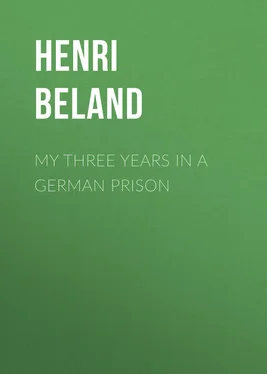Henri Beland - My Three Years in a German Prison
Здесь есть возможность читать онлайн «Henri Beland - My Three Years in a German Prison» — ознакомительный отрывок электронной книги совершенно бесплатно, а после прочтения отрывка купить полную версию. В некоторых случаях можно слушать аудио, скачать через торрент в формате fb2 и присутствует краткое содержание. Жанр: foreign_antique, foreign_prose, на английском языке. Описание произведения, (предисловие) а так же отзывы посетителей доступны на портале библиотеки ЛибКат.
- Название:My Three Years in a German Prison
- Автор:
- Жанр:
- Год:неизвестен
- ISBN:нет данных
- Рейтинг книги:4 / 5. Голосов: 1
-
Избранное:Добавить в избранное
- Отзывы:
-
Ваша оценка:
- 80
- 1
- 2
- 3
- 4
- 5
My Three Years in a German Prison: краткое содержание, описание и аннотация
Предлагаем к чтению аннотацию, описание, краткое содержание или предисловие (зависит от того, что написал сам автор книги «My Three Years in a German Prison»). Если вы не нашли необходимую информацию о книге — напишите в комментариях, мы постараемся отыскать её.
My Three Years in a German Prison — читать онлайн ознакомительный отрывок
Ниже представлен текст книги, разбитый по страницам. Система сохранения места последней прочитанной страницы, позволяет с удобством читать онлайн бесплатно книгу «My Three Years in a German Prison», без необходимости каждый раз заново искать на чём Вы остановились. Поставьте закладку, и сможете в любой момент перейти на страницу, на которой закончили чтение.
Интервал:
Закладка:
Antwerp itself was bombarded for thirty hours unceasingly. The bombardment started in the evening of Wednesday, October 7, and continued until the following Friday morning. During this time it was estimated that no fewer than 25,000 shells fell into the city, shaking it to its deepest foundations.
We remained at the hospital until the following day, Thursday. We had removed the majority of our patients to Ostend. Only a few remained under the care of the brave nuns. I myself was preparing to leave, when a shell burst right in the centre of the operating room close upon the ward where I was occupied. I was slightly wounded, and I left the hospital a few minutes later.
This was on Thursday, October 8, and as I rode on my bicycle through the now deserted streets I could hear above my head the whizzing of the shells fired by the enemy in the direction of the Belgian army headquarters.
The Belgian army headquarters were then at the Hotel St. Antoine, on the Marche aux Souliers (shoe market), a small thoroughfare which leads from Place de Meir to Place Verte. On the day following the fall of the city, I rode back to Antwerp on my bicycle, and to my great surprise I saw that while every vestige of buildings on the opposite side of the street had disappeared–blown into atoms by the German shells–the Hotel St. Antoine had not been touched. The shells had merely grazed the roof of the building before crashing down the opposite side of the street.
The night of October 8-9 was terrible and sinister. From the roof of the house we lived in, at Capellen, we observed the city being devoured by the flames. From the spot where we witnessed this awful scene, it looked as though the whole city were on fire. The oil reservoirs were burning at the same time that other parts of the city were being consumed by the devastating element. In the midst of this horrible carnage, we could see the tower of the great, magnificent cathedral pointing, like the finger of God, toward heaven. It was visible for a minute, then invisible–swallowed up in enormous tongues of fire. In the distance toward the south, where total darkness prevailed, we could observe from time to time flashes of the explosions caused by the German artillery vomiting its volleys of shells on the burning city.
It was an appalling spectacle which lasted through the night. The formidable vibrations caused by explosions repeated on an average of 300 per minute was an experience which is still painful for the imagination to dwell upon. Then on the morning of Friday, October 9, a dismal silence followed the carnage on the fortified city. Antwerp as a Belgian fortress was no more!
CHAPTER VI
THE EXODUS
What a touching spectacle–that of a whole people fleeing to another country! This sight we witnessed in all its tragic pathos. While the Germans approached from the east and south-east towards Antwerp, the population of Malines and the neighboring villages, the people of the villages situated between the outer and the inner lines of the forts, the inhabitants of Duffel, Lierre, Contich, Viedieux and fifty other villages had poured into Antwerp, and when it became evident, on Tuesday and Wednesday, the city would be subjected to the bombardment of the German artillery, all these brave people, probably 300,000 in number–men, women, and children–who had sought refuge in Antwerp, where they hoped they would be safe from the onslaught of the Huns, scattered in all directions to escape the threatening fire. Some 200,000 people, perhaps, crossed the Escaut river and fled, some in the direction of Holland, others toward Ostend. Between 250,000 and 300,000 traversed the highway which leads from Antwerp to Holland.
During the last days of the agony of Antwerp, I was the witness of the constant departure of this desolate people towards Holland.
I had to journey each morning on my bicycle from Capellen to Antwerp and return in the evening. In the morning I had to ride against the surge of escaping refugees; in the evening I rode with the tide, as it were. How can I describe the pathetic sights I witnessed during these days of horror? I saw men and women–many far advanced in years; some of them carried young children on their backs, some in their arms; others pushed carts and wheelbarrows and small vehicles of all kinds, which contained these people’s whole belongings, remnants of the wreck of their homes; beds and bedding, furniture and clothing, religious books and articles of piety. In this great moving caravan were cows and goats, horses and sheep, and the ever-faithful dog–all being led away by the refugees–truly a shattered cohort wending its way with bowed heads, drawn faces, weary eyes, haggard and livid. I say it was a terrible, heartrending sight to witness, one that I hope God will prevent me from ever seeing again.
I shall never forget one case, more pitiful, perhaps, than all the others. It was that of an old man who was pushing a wheelbarrow in which sat his old wife, crippled and paralyzed. It was night, about 9 o’clock. We invited the old couple to spend the night in our home.
During the last week of Antwerp’s resistance, hundreds of refugees would enter the enclosure of our home at Capellen and there improvise for themselves a refuge for the night in the bushes or under the trees. Others, the older men, the women folk and the children, were lodged in the building. Rooms, corridors, garrets, and even the cellars were filled to capacity.
On the following morning these poor refugees would start again on their distressing journey towards Holland–the long, sad walk of a whole people leaving behind them their beloved country, their souls tortured by grief and anguish.
On Friday, the day Antwerp fell, the German troops entered the city at about 9 o’clock in the morning, and what I relate now was conveyed to me personally by a German officer, who took part in the attack on Antwerp and was billeted in our house for more than three months after the capture of the city.
When the Belgian military resistance ended–that is, during the night of the 8th to the 9th of October–the Germans, as I have already stated, continued to bombard the city, but in the morning at 7 o’clock the artillery’s action ceased. Two hours later the order was given to a regiment to pass inside the walls of the city. The Germans thought they would have to fight foot by foot within the walls. For some reason, the opinion prevailed that the whole Belgian army–between 90,000 and 150,000 in number–had concentrated for a last stand within the walls of the city itself.
The Germans, who, according to the information given to me by the officer I have mentioned, had only 55,000 men, actually feared to meet the Belgian army in close battle. But the order was given to enter, and regiment after regiment, with fixed bayonet, marched into the city, alert but quietly, as though in constant dread of being surrounded.
The city was virtually empty. No civilians or military were to be found. The German troops were ordered to halt in front of the Athenée, and a group of officers were directed towards the Belgian army headquarters, in order to obtain information. They were met by one lone janitor, who heroically refused to state where the Belgian army had gone.
The deputation of officers next crossed to the City Hall, where the principal municipal officials awaited them. Here also information as to the direction the Belgian army had taken was refused.
A demand was then made by the German officers for the surrender of the city, but the municipal authorities replied: “As the city is under the command of the military authorities, we have not the necessary authority to surrender it.”
And that is why on the following day a German officer staying at Capellen told us that the situation at Antwerp was rather precarious. While the Germans occupied the ground, the city had not surrendered!
Читать дальшеИнтервал:
Закладка:
Похожие книги на «My Three Years in a German Prison»
Представляем Вашему вниманию похожие книги на «My Three Years in a German Prison» списком для выбора. Мы отобрали схожую по названию и смыслу литературу в надежде предоставить читателям больше вариантов отыскать новые, интересные, ещё непрочитанные произведения.
Обсуждение, отзывы о книге «My Three Years in a German Prison» и просто собственные мнения читателей. Оставьте ваши комментарии, напишите, что Вы думаете о произведении, его смысле или главных героях. Укажите что конкретно понравилось, а что нет, и почему Вы так считаете.











